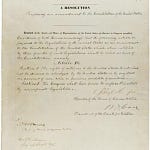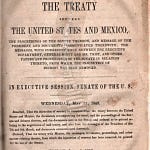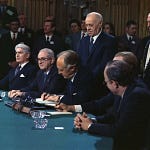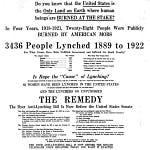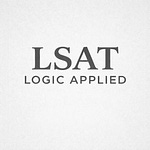On this day in history, July 24th, 1929, the Kellogg-Briand Pact took effect. It was ambitious, as pacts go, because get this – it was an international agreement outlawing war as an implement of foreign policy. In addition to everything else, in typical Nazi fashion, the Third Reich just brazenly ignored the agreement.
The Kellogg-Briand Pact, also known as the Pact of Paris, was an international agreement for peace first established in 1928. The formal name for the pact was the General Treaty for Renunciation of War as an Instrument of National Policy, which committed signatory states to refrain from using war as a means to resolve disputes or conflicts of any origin. Initially signed in the wake of World War I by the United States, France, and Germany, it was later adopted by many other states. The pact was crafted outside the auspices of the League of Nations and was spearheaded by U.S. Secretary of State Frank B. Kellogg and French foreign minister Aristide Briand.
However, the pact's effectiveness and overall impact have been widely debated. Critics point out its inability to prevent a little thing called World War II and the lack of a mechanism for enforcement. Despite its ambitious goals, it was often seen as irrelevant and ineffective, criticized for its legalistic and moralistic tone and its limited influence on foreign policy.
Nevertheless, the Kellogg-Briand Pact wasn't entirely without success or influence. After the Second World War, it provided the legal basis for the concept of a “crime against peace,” which was used in the trials and executions of top Nazi leaders at the Nuremberg and Tokyo Tribunals. Additionally, it paved the way for similar provisions in the Charter of the United Nations and other treaties, contributing to a more proactive American foreign policy. It also arguably contributed to a significant decrease in declared wars post-1945.
Snark aside, the agreement broke new ground. The idea that a multilateral treaty could even attempt to outlaw wars of conquest and, in so doing, render violators pariah states even if war itself couldn’t be forcibly stopped, was a relatively novel concept in the wake of the 19th century’s widespread empire-building. That general idea remains the basis for things like the United Nations and NATO, so good on you Kellogg and Briand.
Starting from August 1, 2023, the U.S. Department of Homeland Security (DHS) will permanently allow employers to verify employment eligibility remotely, as per new regulations. The move comes just before the expiry of temporary COVID-19 era flexibility for employment verification on August 30. The option is exclusively for employers in good standing with the federal E-Verify system.
According to the rule, employers must inspect copies of I-9 documents within three days of an employee's start date, verify authenticity via live video, and acknowledge remote verification on the I-9 form. The rule will not be retroactive and will only apply to new hires post-August 1. In conjunction, the U.S. Citizenship and Immigration Services will release an updated Form I-9 for use from August 1, designed for compatibility with mobile devices. Representatives from the Society for Human Resource Management and the U.S. Chamber of Commerce have hailed this decision as beneficial for the modern workforce and a facilitator for efficient onboarding.
Remote Work Verification Allowed for New Hires Per DHS Rule (2)
Attorneys for Sam Bankman-Fried, the founder of FTX, a cryptocurrency exchange, have denied allegations of witness tampering by prosecutors. The lawyers have agreed to a gag order, despite rejecting claims that Bankman-Fried's interactions with a New York Times reporter constituted witness tampering. These events followed prosecutors' attempts to restrict Bankman-Fried and his allies from making public statements that could potentially impact the case. Previously, FTX, which was valued at $32 billion, filed for bankruptcy after failing to repay depositors, and Bankman-Fried has pleaded not guilty to fraud.
Bankman-Fried's lawyer, Mark Cohen, confirmed that his client had shared personal documents with the New York Times, including writings by former colleague Caroline Ellison, who is cooperating with the U.S. government–let’s call her a witness for simplicity’s sake. The New York Times published an article featuring excerpts from Ellison's personal documents provided to the paper by SBF, including correspondence in which she expressed frustration with the job and over her breakup with SBF. Ellison has pleaded guilty to defrauding investors and is cooperating with prosecutors. SBF continues to deny wrongdoing.
FTX's Bankman-Fried denies witness tampering, accepts gag order
United Parcel Service (UPS) is set to resume labor negotiations tomorrow with the Teamsters union, which represents 340,000 UPS employees, in a bid to avoid a strike that could disrupt supply chains and negatively impact the economy. Since April, discussions have been ongoing concerning a contract for UPS's U.S. drivers, package handlers, and loaders, as their current five-year agreement is set to expire on July 31. UPS stressed the urgency of reaching a fair deal that ensures certainty for customers, employees, and businesses nationwide.
The Teamsters union is pushing for a five-year contract that enhances pay and full-time jobs, and strengthens protections for workers. While preliminary agreements have been reached on removing a two-tier pay system for delivery drivers and installing air conditioning in delivery vehicles, disputes over pay raises for part-time workers remain unresolved. The talks stalled on July 5, with both parties attributing the deadlock to the other.
Just as a quick fun fact, UPS’ gross profit for the quarter ending March 31, 2023 was $17.3 billion. Its gross profit for the twelve months ending March 31 was $73 billion.
United Parcel Service, Teamsters union to resume labor talks on Tuesday | Reuters
New Jersey is suing the Biden administration in an attempt to halt New York City's plan to impose tolls on vehicles in Manhattan. The plan, intended to reduce congestion and fund mass transit, could see a daily toll of up to $23 charged on vehicles in central Manhattan as early as next year. New Jersey claims in its lawsuit that the federal highway administration's environmental review of the plan was insufficient and overlooked the financial and environmental burdens imposed on New Jersey residents.
The state is concerned that the tolls would lead drivers to reroute through New Jersey to avoid the charges, causing environmental, financial, and human impacts. It also points out that New Jersey would not receive money from New Yorkers entering its state. New York City, which holds the record for the most congested traffic in the U.S., estimated in 2022 that the charge would reduce traffic, improve air quality, increase transit use, and generate between $1 billion to $1.5 billion annually, supporting $15 billion in debt financing for mass transit improvement.
New Jersey sues to block New York traffic congestion plan | Reuters
Omegle.com LLC is aiming for a pre-trial victory in a lawsuit that accuses the anonymous video-chatting platform of enabling a predator in Canada to exploit a minor he encountered on the site. In a motion for summary judgment, Omegle has argued that it did not knowingly assist in the abuse and parts of the suit are time-barred by a statute of limitations. The lawsuit, lodged in 2021, alleges that Omegle is defectively designed due to its failure to prevent child access and ban identified predatory users, thereby indirectly engaging in sex trafficking. Omegle contends that as the plaintiff resides in Michigan, local product liability law, which has a three-year statute of limitations, should apply. It further argues that the sex trafficking claims are inapplicable due to the lack of proof that Omegle was directly involved in a commercial sex trafficking venture.
This follows Omegle's unsuccessful attempt to dismiss the lawsuit under Section 230 of the Communications Decency Act. The plaintiff's legal strategy is novel, as it has involved framing the case around product liability to bypass this legislation's protective measures. In other words, they’re aiming to treat the site itself as a faulty product – like a toaster that doesn’t function properly … if that toaster also enabled child predators to contact victims and the toaster manufacturer didn’t do anything to curtail that use.
Omegle.com Seeks Summary Judgment in Sex Trafficking Lawsuit






